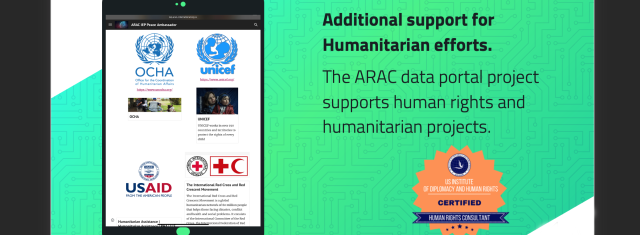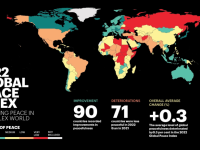News
ARAC International Launches Data Portal for Journalist and Humanitarians
Institute for Economics and Peace (IEP)

ARAC-IEP Data Portal (Source: https://iep.arac-international.org)
ARAC International IEP Ambassador -
ARAC International unveils new web based data portal for the Institute for Economics and Peace (IEP) Ambassadors based in Sydney, Australia. The web portal base on the Institute’s framework for Positive Peace research. The portal is designed to assist independent journalist, researchers, human rights advocates, security analysts, and humanitarians with locating resource references to assist with their respective projects.
The portal itself, is hosted by ARAC in partnership with IEP to serve as tool for researchers and analysts to quickly find resources related human rights issues, conflict and peace studies, global security issues, humanitarian crisis, and government transparency.
ARAC designed the portal as an information resource sharing platform based on IEP’s framework outlined in their research indicators that measure Positive Peace as seen on the Vision of Humanity’s website.
Below is the IEP framework for Positive Peace that ARAC integrated both into the new data portal as well as the ARAC research and workflow process:
The portal itself, is hosted by ARAC in partnership with IEP to serve as tool for researchers and analysts to quickly find resources related human rights issues, conflict and peace studies, global security issues, humanitarian crisis, and government transparency.
ARAC designed the portal as an information resource sharing platform based on IEP’s framework outlined in their research indicators that measure Positive Peace as seen on the Vision of Humanity’s website.
Below is the IEP framework for Positive Peace that ARAC integrated both into the new data portal as well as the ARAC research and workflow process:
Well-functioning Government
Well-functioning Government. A well-functioning government delivers high-quality public and civil services, engenders trust and participation, demonstrates political stability and upholds the rule of law.Sound Business Environment
Sound Business Environment. The strength of economic conditions as well as the formal institutions that support the operation of the private sector. Business competitiveness and economic productivity are both associated with the most peaceful countries and are key to a robust business environment.Equitable Distribution of Resources
Equitable Distribution of Resources. Peaceful countries tend to ensure equity in access to resources such as education, health and, to a lesser extent, equity in income distribution.Acceptance of the Rights of Others
Acceptance of the Rights of Others. Peaceful nations enforce formal laws that guarantee basic human rights and freedoms and the informal social and cultural norms that relate to behaviors of citizens.Good Relations with Neighbors
Good Relations with Neighbors. Harmonious relations with other countries or between ethnic, religious and cultural groups within a country are vital for peace. Countries with positive internal and external relations are more peaceful and tend to be more politically stable, have better functioning governments, are regionally integrated and have lower levels of organized internal conflict.Free Flow of Information
Free Flow of Information. Free and independent media disseminates information in a way that leads to greater knowledge and helps individuals, business and civil society make better decisions. This leads to better outcomes and more rational responses in times of crisis.High Levels of Human Capital
High Levels of Human Capital. A skilled human capital base reflects the extent to which societies educate citizens and promote the development of knowledge, thereby improving economic productivity, care for the young, political participation and social capital.Low Levels of Corruption
Low Levels of Corruption. In societies with high levels of corruption, resources are inefficiently allocated, often leading to a lack of funding for essential services, which in turn can lead to dissatisfaction and civil unrest. Low corruption can enhance confidence and trust in institutions as well as improve the efficiency of business and the competitiveness of the country. (ref: Vision of Humanity | visionofhumanity.org)The presentation of the portal launch for the IEP Ambassador community can be viewed at the link below.
more information: https://www.youtube.com/watch?v=BB2_enQfw3I
Liability for this article lies with the author, who also holds the copyright. Editorial content from USPA may be quoted on other websites as long as the quote comprises no more than 5% of the entire text, is marked as such and the source is named (via hyperlink).






